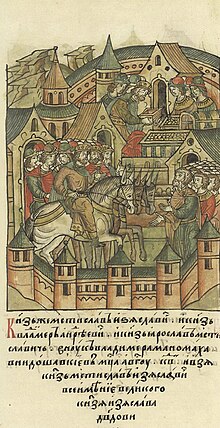Mstislav II Iziaslavich[a] (died 19 August 1170) was Grand Prince of Kiev from 1158 to 1159 and again from 1167 to 1169.[1]
| Mstislav II | |
|---|---|
 Mstislav enters Kiev in 1159, miniature from the Illustrated Chronicle of Ivan the Terrible | |
| Grand Prince of Kiev | |
| Reign | 22 December 1158 – 1159 |
| Predecessor | Iziaslav II |
| Successor | Rostislav I |
| Reign | 19 May 1167 – 12 March 1169 |
| Predecessor | Rostislav I |
| Successor | Gleb I |
| Reign | March 1170 – April 1170 |
| Predecessor | Gleb I |
| Successor | Gleb I |
| Born | c. 1125 Kiev |
| Died | c. 1170 (aged 44-45) |
| Spouse | Agnes of Poland |
| Issue |
|
| House | Rurik |
| Father | Iziaslav II of Kiev |
| Mother | Agnes Hohenstaufen |
| Religion | Eastern Orthodox |
Life
editMstislav was the son of Grand Prince Iziaslav II of Kiev. Along with his father, he participated in the wars against Yury Dolgoruky and the Chernigov princes. After an initial victory against the Cumans in 1153, Mstislav was defeated by the Cumans at the Psel river. Yury Dolgoruky forced him to flee to Poland in 1155, but the next year Mstislav returned with a new army and defeated Dolgoruky at Vladimir-Volynsk. Dolgoruky died in 1157, and Mstislav had himself crowned at Vladimir.
In 1169, Kiev was sacked by Andrey Bogolyubsky who removed Mstislav as grand prince.[2] Mstislav passed his exile in Byzantium and during the reign of Emperor Manuel I Komnenos, was rewarded the district of Otskalana.[3]
Family
editIn 1151, Mstislav married Agnes, the daughter of Duke Bolesław III of Poland.[4] They had three sons:
- Roman, Prince of Novgorod (c. 1152–1205)
- Sviatoslav, Prince of Brest
- Vsevolod Mstislavich of Volhynia (died 1196)
Notes
editReferences
edit- ^ Morby, John E. (2002). Dynasties of the world: a chronological and genealogical handbook. Oxford: Oxford University Press. p. 167. ISBN 9780198604730.
- ^ Janet Martin, Treasure of the Land of Darkness: The Fur Trade and Its Significance for Medieval Russia, (Cambridge University Press, 1986), 127.
- ^ Rus'-Byzantine Princely Marriages in the Eleventh and Twelfth Centuries, Alexander Kazhdan, Harvard Ukrainian Studies, Vol. 12/13, Proceedings of the International Congress Commemorating the Millennium of Christianity in Rus'-Ukraine (1988/1989), 414.
- ^ Nora Berend, Przemysław Urbańczyk and Przemysław Wiszewski, Central Europe in the High Middle Ages: Bohemia, Hungary and Poland, c.900–c.1300, (Cambridge University Press, 2013), 226.